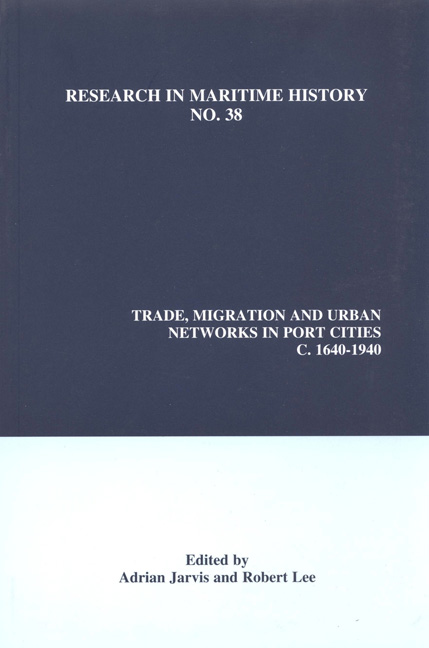Book contents
- Frontmatter
- Table of Contents
- Contributors' Notes
- “Trade, Migration and Urban Networks, c. 1640-1940: An Introduction”
- “Portuguese Jews in Amsterdam: An Insight on Entrepreneurial Behaviour in the Dutch Republic”
- “Contrasting Merchant Communities in the Early Eighteenth Century: Stockholm, Calabar and Charleston”
- “Integration of Immigrant Merchants in Trondheim in the Seventeenth and Eighteenth Centuries
- “In the Eye of the Storm: The Influence of Maritime and Trade Networks on the Development of Ostend and Vice Versa during the Eighteenth Century”
- “Exploiting International Webs of Relations: Immigrants and the Reopening of the Harbour of Antwerp on the Eve of the Nineteenth Century”
- “Migrants, Merchants and Philanthropists: Hierarchies in Nineteenth-Century Greek Ports”
- “Port Cities, Diaspora Communities and Emerging Nationalism in the Ottoman Empire: Balkan Merchants in Odessa and Their Network in the Early Nineteenth Century”
- “Combining Business and Pleasure? Cotton Brokers in the Liverpool Business Community in the Late Nineteenth Century”
“Trade, Migration and Urban Networks, c. 1640-1940: An Introduction”
- Frontmatter
- Table of Contents
- Contributors' Notes
- “Trade, Migration and Urban Networks, c. 1640-1940: An Introduction”
- “Portuguese Jews in Amsterdam: An Insight on Entrepreneurial Behaviour in the Dutch Republic”
- “Contrasting Merchant Communities in the Early Eighteenth Century: Stockholm, Calabar and Charleston”
- “Integration of Immigrant Merchants in Trondheim in the Seventeenth and Eighteenth Centuries
- “In the Eye of the Storm: The Influence of Maritime and Trade Networks on the Development of Ostend and Vice Versa during the Eighteenth Century”
- “Exploiting International Webs of Relations: Immigrants and the Reopening of the Harbour of Antwerp on the Eve of the Nineteenth Century”
- “Migrants, Merchants and Philanthropists: Hierarchies in Nineteenth-Century Greek Ports”
- “Port Cities, Diaspora Communities and Emerging Nationalism in the Ottoman Empire: Balkan Merchants in Odessa and Their Network in the Early Nineteenth Century”
- “Combining Business and Pleasure? Cotton Brokers in the Liverpool Business Community in the Late Nineteenth Century”
Summary
This is a book about merchants and their activities, an historiography which still has many gaps. The merchant is by definition a middleman. He neither produces nor consumes but makes his money by operating a sort of marriage bureau serving lovelorn producers and consumers. As modern shoppers, tempted to the local trading estate by promises that “we cut out the middleman,“ may come to realize, merchants also provide many other services. If you want a few 7/16-inch Whitworth nuts you will not find them in a do-ityourself store, because “odd sixteenths” sizes became difficult to get long before metrification. An old-style engineer's merchant saw it as his business to find some for you. They would cost more than the metric equivalent but his expertise would find what you wanted. That is how he made his profit: effectively through a trade network which allowed him to know who had, or could get, what. But how long should he continue to supply a niche market for obsolete threaded fasteners? Stocking such items on the assumption that the market would survive was a risky business. Investing time in fulfilling a trivial order for something abstruse in the hope that the customer would value the effort and recognize it with an order for several million ten-millimetre nuts is an example of accepting an avoidable risk.
The business of the merchant has long been, and remains, one of risk. When he enters into a contract to supply goods, every stage of the process has its hazards. As the simplest example, goods obtained for onward sale may not be of the quality represented by the vendor, and until recently legal redress in such matters could be difficult or impossible to obtain in many parts of the world, including Britain. Yet Britain was able to build a world domination in mercantile activities at a time when even positive white-collar crime was but sketchily delineated, and the grey areas at the edges of legality were both extensive and even more vague. That this could happen indicates that extralegal methods of limiting fraud and other risks had either evolved or been invented, and there is no reason to suppose that such limitations were peculiar to, or originated in, Britain.
- Type
- Chapter
- Information
- Publisher: Liverpool University PressPrint publication year: 2008

